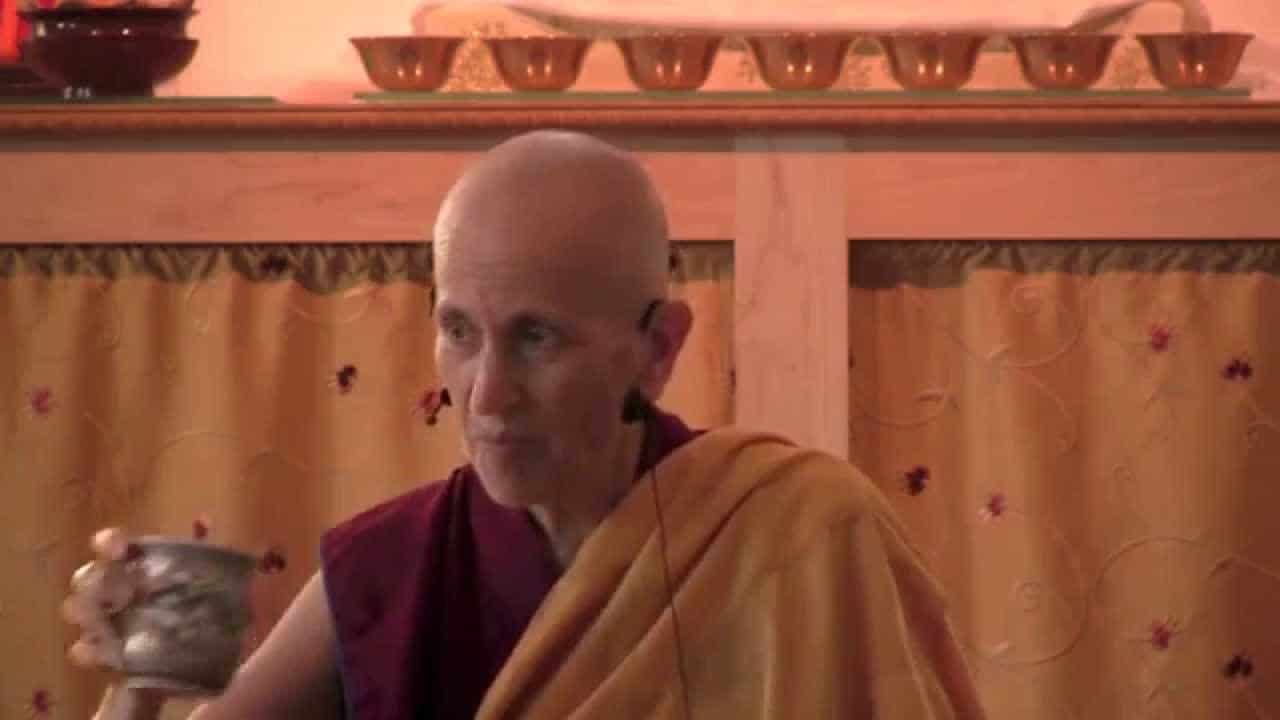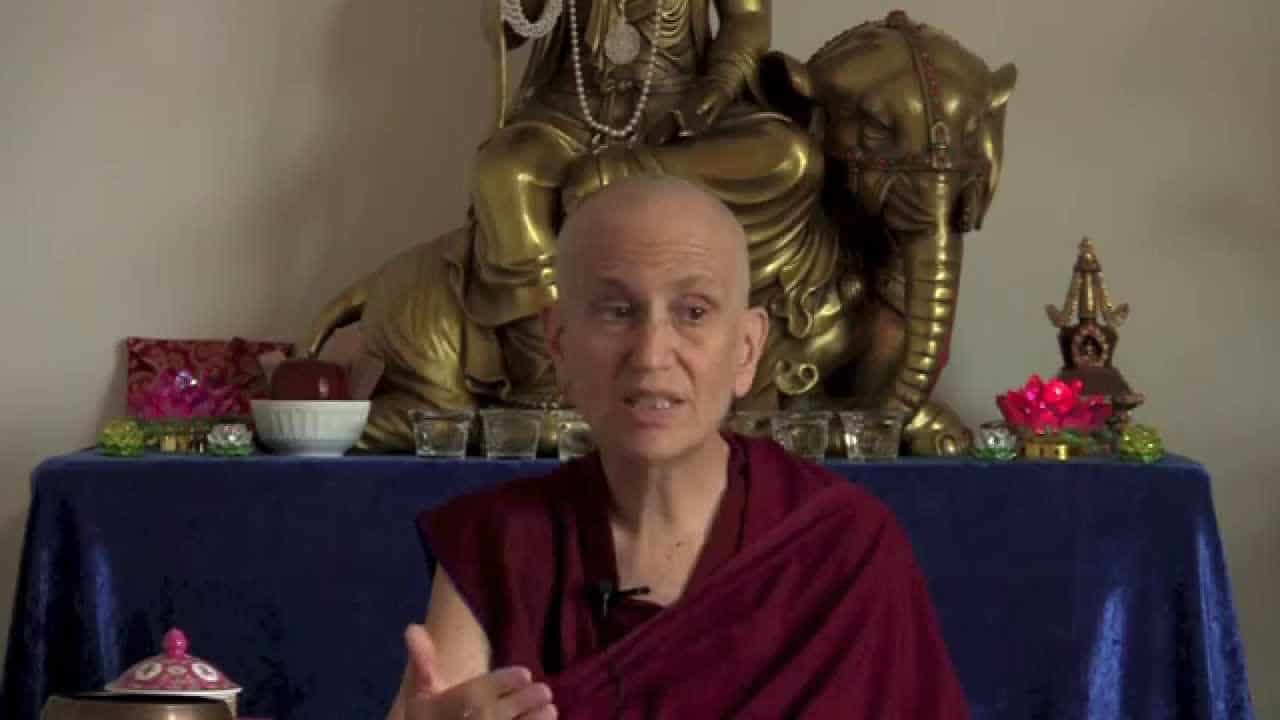Creating the causes for happiness
Part of a series of teachings on the text The Essence of a Human Life: Words of Advice for Lay Practitioners by Je Rinpoche (Lama Tsongkhapa).
- Importance of a long-term view, creating causes for a good future life
- Planning ahead for our next rebirth
- Looking beyond cyclic existence
- Living more in the present by awareness of our present actions and future results of the
- Making life meaningful moment by moment by practicing with mind-training slogans
The Essence of a Human Life: Creating the causes for happiness (download)
We’re still on the same verse. I like that line a lot. [laughter]
You of fine features, you have gained
This opportune and leisured human form.
If you follow me who speaks to help others,
Listen well, I have something to say.
Again, back to the line “this opportune and leisured human form.”
We’ve been talking about our precious human life and the different qualities that it has. It’s not just any human life, it’s a human life with certain qualities that enable us to learn and practice the Dharma. And then we have to understand the meaning of this life, so that’s what I wanted to talk about today.
For people who don’t know anything about the Dharma, then the meaning of this life is have a good time and be successful according to societal standards, or according to your own definition of success, whatever it is. But it involves just worldly things.
As a spiritual practitioner, we’re thinking beyond this life, beyond the information our senses give us. At the first step of our practice then we begin to think about the happiness of future lives. It’s not saying that we shouldn’t be happy in this life. It’s saying that we need to take the happiness of future lives into consideration because we’re creating the causes for our future lives right now.
You know, we always plan ahead. We usually just plan ahead in this life, even though we’re not sure to live that long. But when you have a conviction about rebirth then your plans ahead include your next life–what you’re going to be, what your situation is, whether you’ll meet the Dharma, whether you’ll have good conditions to practice the Dharma, whether you’ll have a lot of Dharma imprints in your mind or not. So that’s the first thing we start to be attentive to is to create the causes for a good human life. We do that principally by practicing ethical conduct. Then practicing generosity, fortitude, other kinds of wholesome actions, and then dedicating those in the proper way.
Also our life is meaningful, if we look beyond this life, to getting off the cycle of existence, to saying a good future life is next, but it’s the same old thing of birth, aging, sickness, and death, and I’ve been doing this for a long time, and it’s time to get off the merry-go-round. And so aiming for liberation, and then practicing the three higher trainings of ethical conduct, concentration, and wisdom in order to create the causes for that.
Then we also make our life meaningful by cultivating the bodhicitta–the aspiration for highest awakening for the benefit of all beings–and then create the causes for that by taking the bodhisattva ethical conduct, and then practicing the six paramitas (generosity, ethical conduct, fortitude, joyous effort, meditative stability, and wisdom), and practicing those, practicing the four ways of gathering disciples, beginning to enter the tantric vehicle, and so on.
We can make this one present life meaningful by creating the causes for all these things in the future. And what’s interesting is by thinking about these future things, it actually helps us to live more in the present, because we’re thinking about future things that we know we have to create the causes for now. So if we have to create the causes for them now, then we need to be really attentive as to what’s going on in our mind and what we’re feeling and thinking and saying and doing, because that’s creating the causes for these good kinds of results that we want to have in the future.
If we realize that it’s important to look at our mind right now and monitor what’s going on in our mind, and learn how to cultivate constructive thoughts and feelings, and so on, then we live much more in the present because we’re not daydreaming about the past (and going, “You know, I went on this great vacation, and this surfing trip I had….”), and not daydreaming about the future (lying on the beach with prince charming, or princess charming, and going to the disco, and blah blah….), but you’re right here with your life right now trying to keep your mind in a perspective that you know is going to be useful for you now and in the future.
So creating the causes for a good rebirth, for liberation, for awakening, and then also, another way to make our life meaningful is this practice of doing things right here at this very time, transforming our mind into something virtuous. And particularly by practicing these gāthas, these kind of slogans that help us transform neutral situations into situations where we create merit, where we enrich our mind by goodness. So instead of just kind of trudging up and down the stairs, thinking “I’m walking upstairs–I’m leading sentient beings to awakening.” When you walk downstairs: “I’m going down the stairs to even the lowest hell realms out of compassion to benefit those beings.” When you’re washing the dishes to think that you’re cleansing the defilements (ignorance, anger, and attachment) and destructive karma from the minds of sentient beings. When you get injured (I was about to say this to Brian before) then think that you’re doing purification. We don’t intentionally injure ourselves, but when we’re injured, if we get sick, then think, “Okay, this is some negative karma ripening, it’s finishing, I’m done with it, it no longer can ripen and impede the path and cause me suffering.” So all these ways to think right now in the present life to transform ordinary situations into the path.
These ways are very good, because it makes us attentive to what we’re doing in trying to think a certain way. So when you’re petting the cats then to think, “May I bring happiness and love to all sentient beings.” When you’re feeding the cats, thinking, “May I feed all sentient beings.” Or when you’re serving food here. That’s why we have the prayer, the verse that we read, before you start cooking, to transform the attitude so that these actions of preparing food here and just doing everyday chores we transform into our Dharma practice.
I very much see going out to the forest and working there as a way of cleaning the garbage out of my mind. Because you walk into an area of the forest and it’s just completely cluttered and crowded, and branches sticking everywhere, and you clean it out so it’s like … all these wrong conceptions in the mind, all this clutter of opinions, all this negative karma from judgments on other people, just cleaning all of that out.
Any ordinary task we do we can transform in this kind of way, and so that’s another way to make our lives meaningful.
It’s really good to think about this because we realize that having a meaningful life exists right now in this present moment. That you don’t wait until Sunday morning, and you don’t wait until you have perfect Dharma conditions to meditate–because anyway, when are those ever going to come? But right now we transform whatever situation we’re in and we use it to create virtue.
And you have somebody like Tara [in audience] who’s doing all sorts of volunteer work in keeping our website up, creating much merit through doing that kind of practice. So we do those kinds of things in this life with a happy mind, thinking that we’re offering service to sentient beings, and offering service to the Dharma, and then our mind is happy doing all sorts of different kinds of things.
Whereas if we don’t practice like this then you have to fill out forms, or you have to do who-knows-what, and it’s like, “Ugh ugh ugh.” And everything just becomes [complaining/grumbling] “I have to do this, I have to do that.” And then, you know, you live your life like that. Your whole life is just one big complaint. Because you pick fault with everything, and who wants to live like that? Doesn’t make any sense at all when we have this potential.
Venerable Thubten Chodron
Venerable Chodron emphasizes the practical application of Buddha’s teachings in our daily lives and is especially skilled at explaining them in ways easily understood and practiced by Westerners. She is well known for her warm, humorous, and lucid teachings. She was ordained as a Buddhist nun in 1977 by Kyabje Ling Rinpoche in Dharamsala, India, and in 1986 she received bhikshuni (full) ordination in Taiwan. Read her full bio.


